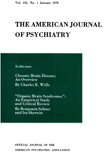PSYCHIATRIC REACTION PATTERNS TO IMIPRAMINE
Abstract
1. One hundred and eighty voluntary inpatients (102 schizophrenic subjects, 67 subjects with affective disorders, and 11 "other" diagnoses) were studied during treatment with imipramine.
2. Seven imipramine induced behavioral reaction patterns and their relationships to diagnosis, age, sex, patterns of medication use, and hospital discharge evaluation are presented. These include mood elevation, explicit verbal denial, manic, reduction of episodic anxiety, agitated disorganization, anhedonic socialization, and non-response.
3. Imipramine was favorably evaluated in 79% of subjects with affective disorders and 51% of schizophrenic patients.
4. The use of psychiatric reaction patterns to psychotropic drugs for categorizing patients and providing a basis for a more rational pharmacotherapy are emphasized.
Access content
To read the fulltext, please use one of the options below to sign in or purchase access.- Personal login
- Institutional Login
- Sign in via OpenAthens
- Register for access
-
Please login/register if you wish to pair your device and check access availability.
Not a subscriber?
PsychiatryOnline subscription options offer access to the DSM-5 library, books, journals, CME, and patient resources. This all-in-one virtual library provides psychiatrists and mental health professionals with key resources for diagnosis, treatment, research, and professional development.
Need more help? PsychiatryOnline Customer Service may be reached by emailing [email protected] or by calling 800-368-5777 (in the U.S.) or 703-907-7322 (outside the U.S.).



